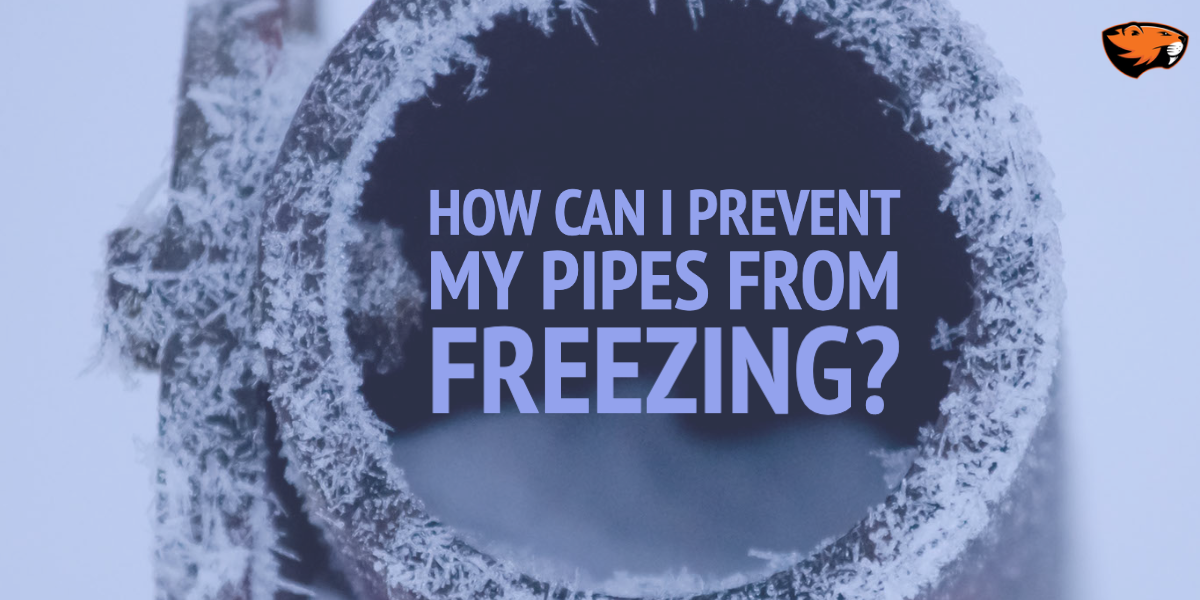In Ohio, we are still facing the winter weather, which causes several problems in our household. One, in particular, is frozen pipes. Some of you may think that frozen pipes are a minor issue; however, they can lead to other problems, like cracks and pinhole leaks. Plus, you won’t be able to access running water if your pipes are frozen. In fact, frozen pipes are one of the plumbing problems we consider an emergency at Beavercreek Plumbing & Drain.
Most of the time, repairing this usual household problem should be done immediately. For this reason, our professional plumbers have made a list of ways to prevent frozen pipes. Through these recommendations, homeowners can combat this inopportune situation and prepare their homes for the coldest winter days.
Locate the Water Shut Off Valve
Frozen pipes are one of the most common plumbing problems encountered by homeowners. The good news is that you can prevent this issue if you know basic plumbing. To be specific, you need to know where and how water enters your house. Additionally, you should also determine the location of the water shut-off valve. Suppose you’re not familiar with this valve. In that case, you can ask a professional plumber to find it the next time you need a plumbing repair service.
There are numerous ways to prepare your house for the cold winter days. For one, you can shut off all the valves in and out of your home. Aside from that, you should also disconnect and set aside external hoses. Finally, if your house has a crawl space, you must seal and insulate the whole area. By following these tips, you can make sure that all exposed pipes will not freeze.
If you’re unsure if your house is fully prepared for the harsh winter weather, you can contact Beavercreek Plumbing & Drain. Our professional plumbers can do a thorough plumbing inspection. From there, they can determine which areas of your home need to be fixed.
Cover Exposed Pipes
After you have determined any plumbing problems and exposed pipes, the best way to prevent frozen pipes is to cover the lines with insulation. If you want to save money, a budget-friendly method you can do is to wrap the interior and exterior of your house with old newspapers.
Afterward, you also have to seal or cover any openings or holes in your crawl space. You can use styrofoam to cover the gaps and keep the cold air out of your house. Aside from that, you also have to seal the interior and exterior parts of your windows, doors, and faucets. Lastly, you have to cover any holes or cracks near the water pipes with foam insulation to add an extra layer of protection.
Keep Your Home Warm
Once you have completely covered the critical areas with insulation, the next step is to keep your home warm by setting the thermostat to a minimum of 55 degrees Fahrenheit. Even so, our professional advice is to use the ideal temperature, which is 68 degrees Fahrenheit. Additionally, you should open your bathroom, sink, and cabinets. By doing this step, you can expose the pipes. From there, warm air can circulate throughout these areas.
If you noticed that one of your rooms is colder than the rest, our professional advice is to use a space heater. This device can help prevent freezing, especially if you place it close to the exposed pipes.
If you don’t have a space heater, an alternative you can use is a lamp. Remember, lightbulbs emit heat that is usually enough to prevent frozen pipes. Finally, you have to make sure that there are no combustible objects, like cleaners and chemicals, in the room if you’re going to use a lamp or space heater to avoid accidents. However, if you do decide to use a space heater, make sure you read the directions and use it at your own discretion.
Turn On Your Water Spouts
One of the best ways to prevent pipes from freezing is to turn on your water spouts where there are exposed pipes before going to sleep. This method can help prevent frozen pipes because you’re allowing warm water to flow continuously.
Do you have concerns or questions about winterizing your house, locating your home’s water valve, protecting or covering exposed pipes, or anything related to the various preventive measure for frozen pipes?
If so, you can call Beavercreek Plumbing & Drain today at (937) 404-6575, or schedule an appointment online now by clicking here, and one of our professional plumbers can help you prevent freezing pipes or solve any plumbing problems.




